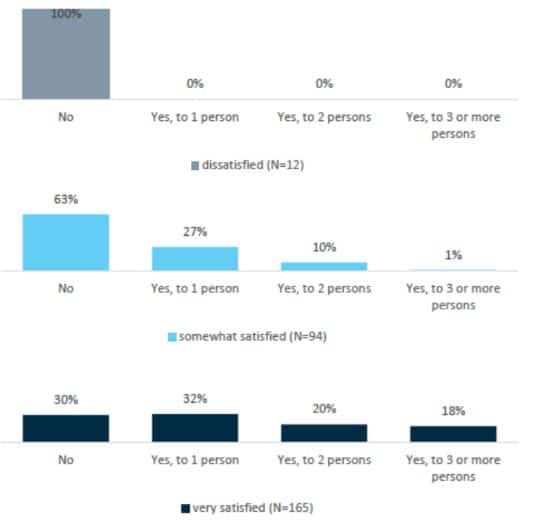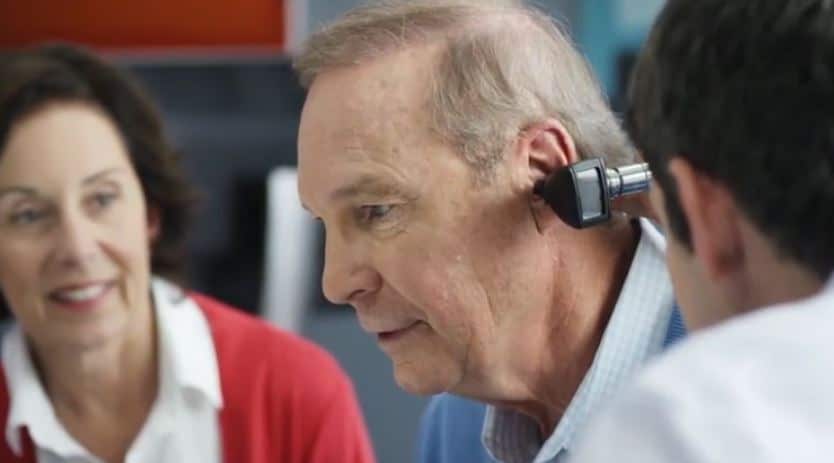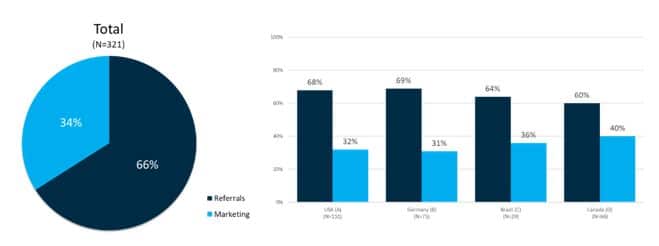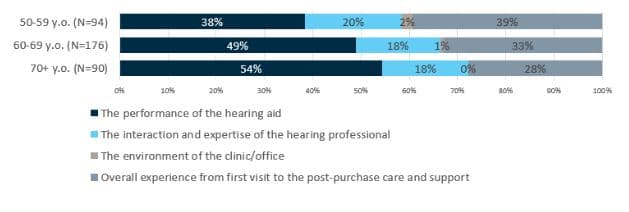“It is not the strongest of the species that survives, nor the most intelligent, but the one most responsive to change.”
–Charles Darwin (1809)
By Donald Hayes, Ph.D., Director of Clinical Research, Unitron
The information age, like the agricultural and industrial revolutions that marked transition periods before it, has provided humanity with new tools. Those tools offer us unique opportunities while simultaneously reshaping how we perceive our world.
Access to ubiquitous information gathering tools provides healthcare consumers with a new sense of empowerment. Doing their own research allows them to engage with healthcare providers as contributing partners in their treatment solutions rather than passive recipients of someone else’s expertise. There are myriad other ways that the new consumers differ from their parents. I would like to share some of what we have learned about this emerging class of healthcare consumers.
“I don’t adapt to my environment. My environment adapts to me.”
–Chuck Norris, (always)
Sadly, there is only one Chuck Norris. The rest of us should take our cue from Charles Darwin. As new healthcare consumers emerge, it is incumbent upon us as providers to respond to change or risk our survival. To understand something about these people we undertook a brief survey of 360 hearing aid owners and non-owners1.
Armed with some background about their motivations, we have a few suggestions as to how we may respond to this changing environment and not only survive but flourish as professionals.
We should be partners
Of the 360 respondents to the survey, 66% said that they, “would like to be an active participant in the process and the decision”. Only 34% indicated that they, “would rather follow an expert recommendation from a hearing care professional”. We subdivided the hearing aid owners into those who were very satisfied, somewhat satisfied or dissatisfied with their devices. We learned that the more dissatisfied they were with their current hearing aids, the more they wanted to be an active participant in the process and decision on the next pair: 59% of the very satisfied people said so, as did 67% of the somewhat satisfied and a substantial 92% of the dissatisfied group preferred active participation.
In the end, the more informed they are and the better they understand the devices they are purchasing, the more engaged they can become in the process. One excellent way to do this is through the use of a take home trial. 87% of our respondents reported that a take home trial would be beneficial.
This will improve my quality of life
We frequently warn people that hearing loss may be related to the risk of dementia and cognitive fatigue. But is that really the right message for us to send them?
We asked our group about the emotions that described how they felt when they purchased their hearing aids. Of the nine emotions we gave them, ranging from very positive to very negative, the top five they reported in order from most common to least common were; hopeful, optimistic, curious, excited and guarded. 25% of the respondents said they felt guarded. It was the first negative emotion reported and it came in fifth on the list. 64% reported feeling hopeful and 60% were optimistic by comparison.
Despite a lot of negative messaging, the reasons why people purchase hearing aids are driven overwhelmingly by positive objectives. We asked our group to pick the three most important reasons for them to purchase hearing aids from a list of six positive and six negative reasons.
The top four reasons they gave us were all positive:
- Hearing aids improve the quality of life – 74%
- Hearing aids improve the ability to participate in group activities – 49%
- Hearing aids improve relationships at home – 41%
- Hearing aids improve your social life – 38%
Coming in fifth was our first negative message; hearing loss gets worse – 31%. It was the only negative message in the top seven. The bottom five were all negative. It seems as though today’s consumer is not very motivated by fear. Instead, the top four reasons for purchase included the words “Hearing aids improve…”
Perhaps it is time to make our messaging more positive by focusing our counseling on the many benefits of hearing aids rather than trying to scare these people into buying them.
Yes I am satisfied. But am I delighted?
If I were to ask a room full of hearing care professionals, “How many of you believe that your clients are mostly dissatisfied with your service or the hearing aids you provide?”, not a single hand would go up. That’s a good thing. When I ask the room, “How many of you believe that your clients are mostly satisfied with your service and the hearing aids you provide?” At this point, almost every hand in the room would go up, also a good thing. Then comes the tough question. “How many of you believe that your clients are so delighted with you and their hearing aids that they would advocate for you when they leave your office?”
There is a significant distinction between someone who is satisfied and someone who is delighted. Most professionals are absolutely right to raise their hands when asked if their clients are satisfied. Most people who purchase modern hearing aids are indeed satisfied with them. But in this case, the good is the worst enemy of the best.
We asked the 271 hearing aid owners who took our survey the following question1. “How satisfied were you with the whole experience of getting your hearing aids, from the first visit until post-purchase care?” Here is how they responded:

It turned out that 96% of the people who had purchased hearing aids were either somewhat satisfied or very satisfied.
Therefore, our hypothetical room full of professionals would be quite right. Now let us see how many of those people are so delighted that they would advocate for the professional who fit them with their devices. We asked them, “Did you refer your hearing care professional or clinic to others?” Here is how they responded:

The dissatisfied people provided no referrals. Those who were somewhat satisfied referred the professional or their clinic to one or two people about one third of the time. However, 70% of the very satisfied respondents provided one or more referrals. Almost one in five of the very satisfied offered referrals to three or more of their friends and family.
In other words, the more delighted our clients are with us, the more people they tell about us and the more they refer their friends and family back to see us. Fully 70% of those individuals who feel very satisfied become advocates for us, whereas only half that many who feel somewhat satisfied will refer to us.
This is crucially important to clinics who wish to grow and prosper in this modern era. We surveyed clinicians who are running successful and growing practices in four different countries2. We wanted to know how they brought new clients into their clinics. Did they rely on the traditional print and radio media to grow their practices? Or was there another mechanism by which they stimulated growth?
Here is what they told us:
Two thirds (66%) of their new clients came to them through referrals from the their previous clients. The numbers are remarkably consistent regardless of the country where we asked the question; USA, Germany, Brazil or Canada. At least six out of ten new clients came from a referral. Given this information, it is critical that we provide these new hearing healthcare consumers not only with excellent hearing aids but a fully engaging experience.
Is the experience really that important?
To test this theory and the relationship between the new healthcare consumer and the desire for the full experience, we polled our original 360 people. We asked them, “When you think about the satisfaction with the hearing aid purchase in general: which of the following would likely lead to an excellent level of satisfaction?” Then we scored their answers by age cohort; 50-59, 60-69 & 70+ y.o.
We gave them a multiple choice between the four options in the legend of the figure above. We can see in the figure that the two biggest drivers of satisfaction out of the four are hearing aid performance and the over all experience.
However, it is clear that the overall experience is noticeably more important for the younger cohort than for the older ones. In fact, in the 50-59 y.o. group the overall experience (39%) is equally as important as the performance of the hearing aid (38%). Conversely, hearing aid performance is roughly twice as important as the experience for the 70+ y.o.’s.
What does it all mean?
Access to the Internet and a mountain of information about healthcare options has altered not only the healthcare consumers’ approach to their own treatment but also the relationship between them and the professionals with whom they interact. As professionals, we can continue to treat them exactly as we have their predecessors. Or we can acknowledge that they do not approach the process of personalized healthcare the same way their parents and grandparents did. They are willing to take some ownership of their own outcomes and they wish to be partners in the process as opposed to passive recipients of treatment.
These new consumers approached the experience with a mixture of hope, curiosity and excitement, not fear or trepidation. They believe that their hearing aids will help improve their lives, their personal relationships and their social interactions. When they are very satisfied with their hearing aids or their hearing healthcare provider, they will refer that service to as many as three of their friends and family members. They are a key source of new clients for a growing business and the best way to satisfy them is to provide them with a fully positive experience from end-to-end.
This is how we can provide the most possible benefit to those we have chosen to treat.
Citations:
- Unitron Insights into Healthcare Consumers July 2016
- 2015 Global HHCP Best Practice Marketing research
 Donald Hayes, Ph.D., is the Director of Clinical Research for Unitron Hearing and is responsible for leading the company’s audiology research efforts, as well as new product concept testing and validation. Don joined Unitron in 2002 as Manager, Audiology Research and works with a network of audiology experts around the world to develop new hearing solutions that incorporate innovative technologies and improve the lives of people with hearing loss. Don holds a Ph.D. in Audiology from the University of Cincinnati and has published articles in several peer-reviewed and trade journals over the years.
Donald Hayes, Ph.D., is the Director of Clinical Research for Unitron Hearing and is responsible for leading the company’s audiology research efforts, as well as new product concept testing and validation. Don joined Unitron in 2002 as Manager, Audiology Research and works with a network of audiology experts around the world to develop new hearing solutions that incorporate innovative technologies and improve the lives of people with hearing loss. Don holds a Ph.D. in Audiology from the University of Cincinnati and has published articles in several peer-reviewed and trade journals over the years.









I had my hearing tested, but I’m not sure what kind of hearing aid to get. It makes sense that I would want to find a hearing aid that has a big effect! That way I can ensure that it’s the best one for me.